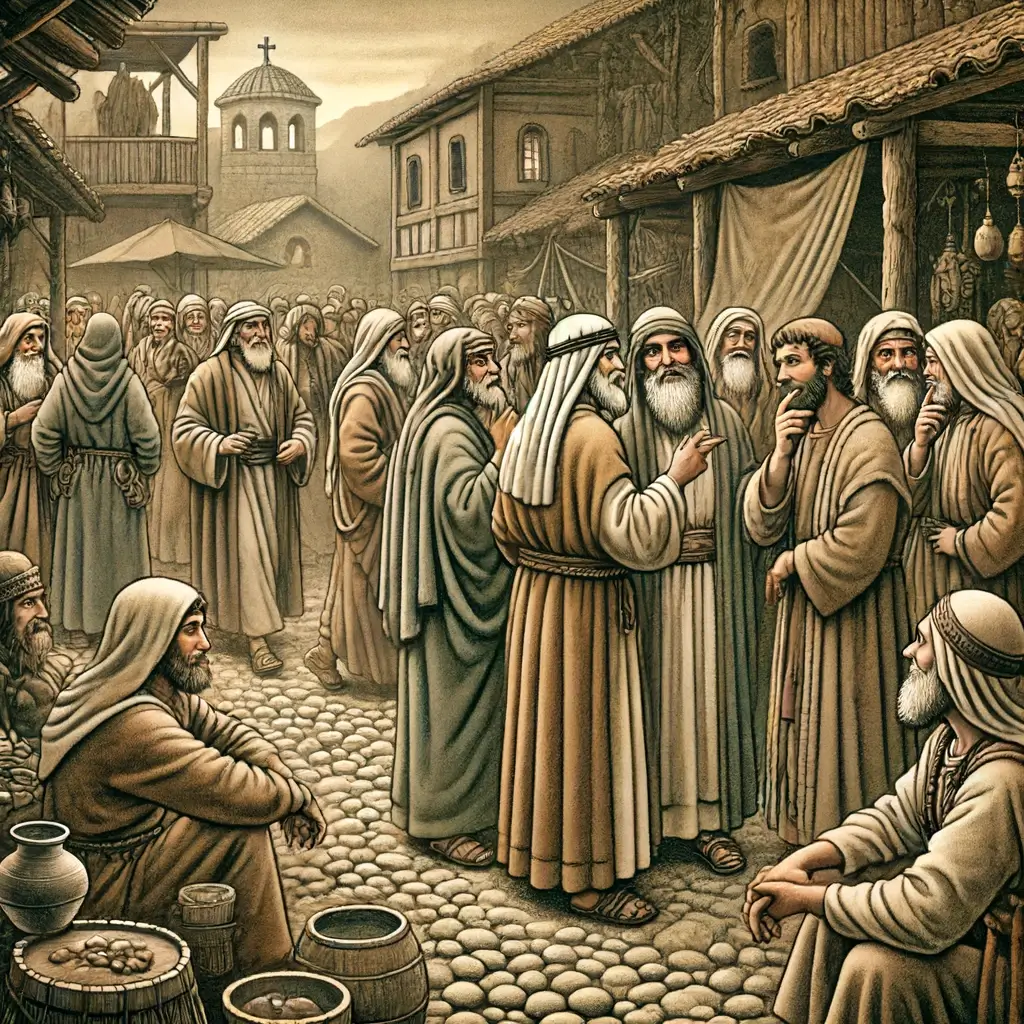Main conclusions:
- Who was a gossip in the Bible: Reveals the significant role they play in the narratives, acting as catalysts for important events and revealing complex aspects of human nature.
- Gossipin the Bible: Characters such as Miriam, the unfaithful spies, Ham, Doeg, Judas Iscariot, Joseph’s brothers, illustrate the devastating consequences of gossip in the Bible and their gossip, showing how words can be used to inflict pain, promote personal agendas and erode family ties.
- What is gossipaccording to the Bible: The Bible addresses the issue of “what is gossip according to the Bible” in a clear and direct manner, condemning this type of behaviour in several passages. Who was a gossip in the Bible and gossip is seen as a harmful practice that can cause divisions, conflicts and damage relationships between people.

who was a gossip in the bible?
The Holy Whispers: The Presence of Gossipers in the Bible
In the vastness of the Holy Scriptures, we find various accounts that highlight the presence of gossips in the Bible, individuals who, through distorted or malicious information, cause conflicts and negatively affect the relationships between biblical characters.
These characters play a significant role in the narratives, serving as catalysts for important events and revealing complex aspects of human nature. Analysing who was a gossip in the Bible is essential for a deeper understanding of the messages and lessons contained in the sacred texts.
By examining their actions and consequences, we can reflect on moral, ethical and social issues present in both biblical and contemporary times. Therefore, immersing ourselves in this study allows us not only to understand the historical context of the narratives, but also to extract timeless teachings about the power of words and trust.
Verses about gossip
The Bible addresses the subject of who was a gossip in the Bible in a clear and direct way, condemning this type of behaviour in several passages. Not only who was a gossip in the Bible, but gossip itself is seen as a harmful practice that can cause divisions, conflicts and damage relationships between people. Here are some biblical passages that talk about gossip:
- Proverbs 16:28 – “A wicked man stirs up strife, and a slanderer separates close friends.” This verse highlights how gossip can destroy friendships and create conflicts.
- James 4:11 – “Brothers, do not speak evil of one another. Whoever speaks evil of a brother or judges his brother speaks evil of the law and judges the law; and if you judge the law, you are no longer an observer of the law but a judge.” Here, James warns against speaking evil of others, emphasising that this is contrary to God’s will.
- Ephesians 4:29 – “Let no unwholesome word proceed out of your mouth, but only such as is good for building up, that it may give grace to those who hear.” Paul encourages Christians to use their words to edify, not to destroy, as is the case with gossip.
- Leviticus 19:16 – “You shall not walk as a gossip among your people; you shall not set yourself against the blood of your neighbour. I am the Lord.” This Old Testament verse clearly forbids gossip among God’s people.
- Proverbs 20:19 – “A gossip reveals a secret; therefore do not meddle with one who opens his lips wide.” Here, the author of Proverbs warns of the dangers of trusting gossipers.
Who was a gossip in the Bible and gossip, according to the Bible, is seen as a practice that dishonours God and causes significant damage to people and communities. The Bible encourages believers to speak in an edifying way and to avoid spreading rumours and gossip that could harm others.
doegue the gossip?

Yes, Doeg the Edomite is an example of a gossip in the Bible. He is mentioned in 1 Samuel 21-22. Doeg was one of Saul’s servants and reported to the king that the priest Ahimelech had helped David by providing him with bread and Goliath’s sword. Doeg’s gossip led to the execution of Ahimelech and other priests.
Doeg’s betrayal was based on malicious gossip and self-interest, revealing how words can be used to inflict pain and promote personal agendas. This story invites us to reflect on the devastating repercussions of gossip when combined with betrayal.
1 Samuel 22:9-10 – “Then Doeg the Edomite, who was also with Saul’s servants, answered and said, ‘I saw the son of Jesse when he came to Nob, to Ahimelech the son of Ahitub. And he enquired of the Lord for him, and gave him provisions, and also gave him the sword of Goliath the Philistine.'”
1 Samuel 22:18-19 – “Then the king said to Doeg: ‘Turn round and charge at the priests.’ So Doeg the Edomite turned and came against the priests, and that day he killed eighty-five men who were wearing the linen ephod. And he smote Nob, the city of the priests, with the edge of the sword, both men and women, children and sucklings, oxen and asses and sheep, with the edge of the sword.”
Doeg, by informing Saul about Ahimelech’s help to David, showed himself to be one of the Bible’s gossips who caused the deaths of many innocent people.
Gossip in the Bible: Judas Iscariot

Judas Iscariot is recognised as one of Jesus Christ’s disciples who betrayed him for 30 pieces of silver. His decision to hand over his Master to the religious leaders was influenced by gossip and conspiracies plotted among the Saviour’s closest followers.
Judas’ tragic story vividly illustrates the dangers of irresponsibly spreading distorted information and its potentially damaging influence on interpersonal relationships. Analysing the case of Judas leads us to ponder the devastating ramifications that gossip can have on our lives.
Who Was a Gossip in the Bible: Joseph’s Brothers
A less explored example in analysing who was a gossip in the Bible involves Joseph’s brothers in the Old Testament. Driven by envy and greed, they conspired against their own brother by selling him into slavery in Egypt. This cruel act was fuelled by the insidious spread of false rumours about Joseph within the family, highlighting how gossip can corrode the closest family ties and lead to moral and emotional ruin.
Who Was a Gossip in the Bible: Miriam the Prophetess

On the list of those who gossiped in the Bible is Miriam and it is written in the book of Numbers, chapter 12, in the Bible. Miriam, the sister of Moses and Aaron, was an important figure among the Israelites during the exodus from Egypt. She is described as a prophetess and played a significant role in various events.
The Gossip
Miriam and Aaron began to speak against Moses because of his Ethiopian (Cushite) wife. They said: “Has the Lord spoken only through Moses? Has he not also spoken through us?” (Numbers 12:1-2). This act of gossip and questioning was not only about Moses’ marriage, but also an attempt to undermine his leadership and authority.
The Consequence
God overheard Miriam and Aaron’s conversation and called the three of them to the Tent of Meeting. God descended in a pillar of cloud and stood at the entrance to the Tent. He rebuked Miriam and Aaron for speaking against Moses, pointing out that Moses was faithful in all God’s house and that He spoke to Moses face to face, clearly and not in riddles.
Miriam’s punishment
As a consequence of her gossip and rebellion, Miriam was afflicted with leprosy, which left her “white as snow”. Aaron, seeing his sister’s condition, asked Moses to intercede with God to heal her. Moses cried out to the Lord, and God replied that if her father had spat in her face, shouldn’t she be ashamed for seven days?
Therefore, she should be isolated outside the camp for seven days and then she could be brought back. So Miriam was put outside the camp for seven days, and the people didn’t leave until she was reinstated.
Who Was a Gossip in the Bible: Haman
The story of Haman who was a gossip in the Bible is told in the book of Esther in the Bible. Haman was a high official in the court of King Ahasuerus (Xerxes I), and his story is a classic example of wickedness, pride and the ultimate consequence of his actions.
Haman, son of Hammedatha, was an Agagite and held a position of great power in the Persian empire. He became the chief minister of King Ahasuerus. Mordecai, a Jew who lived in the fortress of Shushan, would not bow down or pay homage to Haman, which aroused Haman’s anger against Mordecai and his people.
Gossip and Conspiracy
Haman, angered by Mordecai’s disobedience, decided not only to punish Mordecai, but to exterminate all the Jews in Ahasuerus’ kingdom. He went to the king and spread slander about the Jews, saying that they were a different people, that their laws were different from those of other peoples and that they didn’t obey the king’s laws.
He suggested that it was not in the king’s interest to tolerate them and proposed issuing a decree to destroy them, offering to pay a large sum of money into the royal treasury to carry out this plan (Esther 3:8-9).
King Ahasuerus, trusting Haman, gave him his signet ring and authorised him to do whatever he wanted with the Jews. Haman then issued a decree in the king’s name, setting a date when all the Jews, young and old, women and children, would be destroyed and their property plundered.
The reversal
When Mordecai heard about the decree, he tore his clothes, put on sackcloth and ashes, and mourned publicly. He informed his cousin Esther, who had become queen, about Haman’s plan and asked her to intercede with the king.
Esther, after fasting and praying, courageously went before the king without being asked, risking her own life. She revealed Haman’s evil plan to the king and revealed that she herself was Jewish. The king, enraged to learn that his queen was threatened by the decree, went out into the palace garden.
When he returned, he found Haman begging for his life at Esther’s feet. Interpreting this as an attack on the queen, the king ordered Haman to be hanged on the gallows he had prepared for Mordecai (Esther 7:9-10).
The consequences
After Haman’s death, the king gave Haman’s house to Queen Esther and his signet ring to Mordecai, who took over Haman’s position. A new decree was issued, allowing the Jews to defend themselves against their enemies, resulting in a great victory for the Jews throughout the province.
Who Was a Gossip in the Bible: Diotrephes
The story of Diotrephes who was a gossip in the Bible is recorded in the third epistle of John, in the New Testament of the Bible. Although it is a brief mention, it is significant and offers us important lessons about leadership and behaviour in the church.
The Third Epistle of John is a letter written by the apostle John to a man called Gaius, who was a leader in the church. In this letter, John praises Gaius for his hospitality and faithfulness, but also addresses problems caused by Diotrephes, another leader in the same Christian community.
Gossip and the Behaviour of Diotrephes
Diotrephes is described as a person who “loves to have the pre-eminence” (3 John 1:9), that is, he liked to be the most important and to be in a position of authority. Diotrephes refused to accept the apostle John’s authority and was spreading malicious rumours against him and other church leaders.
John writes:
“I have written to the church; but Diotrephes, who likes to be foremost among them, will not receive us. Therefore, if I go, I will bring to remembrance the deeds that he does, speaking malicious words against us; and not content with these things, he does not even receive the brethren himself, but hinders those who want to receive them, and drives them out of the church.”
3 John 1:9-10
Who Was a Gossip in the Bible: Bad Men of Israel

The story of the bad men of Israel who spread slander about Naboth is a tragic and dark example of how gossip and injustice can have devastating consequences. This story is found in the book of 1 Kings, chapter 21.
Naboth was a man from Jezreel who owned a vineyard next to King Ahab’s palace in Samaria. Ahab wanted Naboth’s vineyard to use as a vegetable garden, offering him a better vineyard or money in exchange. However, Naboth refused the offer, saying that he couldn’t give up his parents’ inheritance.
Gossip and Conspiracy
Ahab returned home upset and depressed by Naboth’s refusal. His wife, Jezebel, realising Ahab’s state, asked him the reason for his sadness. When Ahab told her about Naboth, Jezebel decided to act to obtain the vineyard for the king.
Jezebel wrote letters in Ahab’s name, sealed them with the king’s seal and sent them to the leaders and nobles of Naboth’s city. The letters instructed these men to proclaim a fast and put Naboth in a prominent place among the people. They were then to find two men of vile character who would falsely accuse Naboth of having cursed God and the king. The consequence of this accusation would be Naboth’s execution by stoning.
The leaders and nobles of the city, obeying Jezebel’s orders, organised the fast and followed the plan. They found two wicked men who testified falsely against Naboth, accusing him of blasphemy. Naboth was condemned and stoned to death.
The consequences
After Naboth’s death, Jezebel told Ahab to take possession of the vineyard, since Naboth had been executed. Ahab took possession of the vineyard, apparently without remorse for the way he had obtained it.
However, God saw the injustice committed and sent the prophet Elijah to confront Ahab. Elijah told Ahab that, because of his sin and injustice against Naboth, he would face a terrible punishment.
Elijah prophesied that dogs would lick up Ahab’s blood in the same place where dogs licked up Naboth’s blood, and that Ahab’s family would be exterminated. Jezebel would also face a horrible fate; the dogs would devour her body by the wall of Jezreel.
gossip in the bible
In the Bible, there are several characters who were gossips, figures who were involved in gossip or slander. Below is a table with a detailed overview of who was a gossip in the Bible:
| Who was a gossip in the Bible | Type of Gossip | Consequences |
|---|---|---|
| Miriam | Gossip about Moses’ marriage to a Cushite woman | God punished her with leprosy for seven days (Numbers 12:1-10) |
| Haman | Spread slander about the Jews to King Ahasuerus | He was hanged on the gallows he had prepared for Mordecai (Esther 7:10) |
| Diotrephes | Spoke ill of the apostles and church leaders | Was publicly rebuked by John (3 John 1:9-10) |
| Doeg, the Edomite | Informed Saul about Ahimelech’s help to David | Massacre of the priests of Nob (1 Samuel 22:9-19) |
| Evil men of Israel | False accusations against Naboth | Naboth was stoned to death (1 Kings 21:13) |
| Judas Iscariot | Conspiracy | Led to the betrayal of Jesus Christ for 30 pieces of silver, demonstrating the dangers of gossip (Matthew 26:14-16) |
| Joseph’s brothers | Family intrigues | Plotted against Joseph out of envy and greed, resulting in moral and emotional ruin (Genesis 37:18-28) |
The biblical gossip episode of Joseph’s brothers serves as an impactful reminder of the destructive power of words when used with evil intent.
These examples highlight the complexity of human relationships present in the Holy Scriptures and underscore the fundamental importance of critical reflection on the role of gossip in the Bible for our broader understanding of human behaviour under various historical and social circumstances.
FIVE FACTS ABOUT WHO WAS A GOSSIP IN THE BIBLE:
- Who was a gossip in the Bible: Doeg betrayed David to King Saul with malicious information, resulting in serious consequences for David (source: 1 Samuel 22).
- Who was a gossip in the Bible: Judas Iscariot conspired with religious leaders against Jesus Christ, influenced by gossip and conspiracies (source: Matthew 26:14-16).
- Who was a gossip in the Bible: Joseph’s brothers spread false rumours about him, which led to him being sold into slavery in Egypt (source: Genesis 37).
- The actions of gossips in the Bible highlight the complexity of human relationships and the destructive potential of words (source: various biblical texts).
- The study of who was a gossip in the Bible offers insights into moral and ethical issues present both in biblical times and today (source: various biblical passages).
what is gossip according to the bible?
According to the Bible, gossip is seen as a harmful and sinful practice that can cause division, conflict and damage interpersonal relationships. The Bible condemns gossip and gossipers in the Bible in several passages, emphasising the importance of using words to build up, not tear down. Here are some verses that address the issue:
- Proverbs 16:28 – “A wicked man stirs up strife, and a slanderer separates close friends.”
- James 4:11 – “Brothers, do not speak evil of one another. Whoever speaks evil of a brother or judges his brother speaks evil of the law and judges the law; and if you judge the law, you are no longer an observer of the law, but a judge.”
- Ephesians 4:29 – “Let no unwholesome word proceed out of your mouth, but only such as is good for building up, that it may give grace to those who hear.”
- Leviticus 19:16 – “You shall not walk as a gossip among your people; you shall not set yourself against the blood of your neighbour. I am the Lord.”
- Proverbs 20:19 – “A gossip reveals a secret; therefore do not meddle with one who opens his lips wide.”
In summary, what is gossip according to the Bible? it is a practice that dishonours God and can cause significant damage. Believers are encouraged to avoid spreading rumours and gossip, and to speak in a way that promotes edification and harmony among people.
FREQUENTLY ASKED QUESTIONS: WHO was a gossip in the BIBLE?
Who in the Bible was a gossip?
Who gossips in the Bible?
What did Jesus say about gossip?
What is the sin of gossip?
What was David’s lie?
What does Proverbs 13:3 say?
What is written in James 1:26?
What does Proverbs 16:3 say?
Who is a gossip?
What is the true meaning of the word gossip?
What does the Bible say about false people?
How can we get rid of the sin of gossip?
When does gossip become a mortal sin?
who was a gossip in the bible?
what is gossip according to the bible?
doegue gossip?
Carlos Alberto is a Bible scholar dedicated to helping people find answers to their questions related to Scripture. His passion and knowledge are a trusted source of guidance and enlightenment for those seeking understanding in God’s Word.






